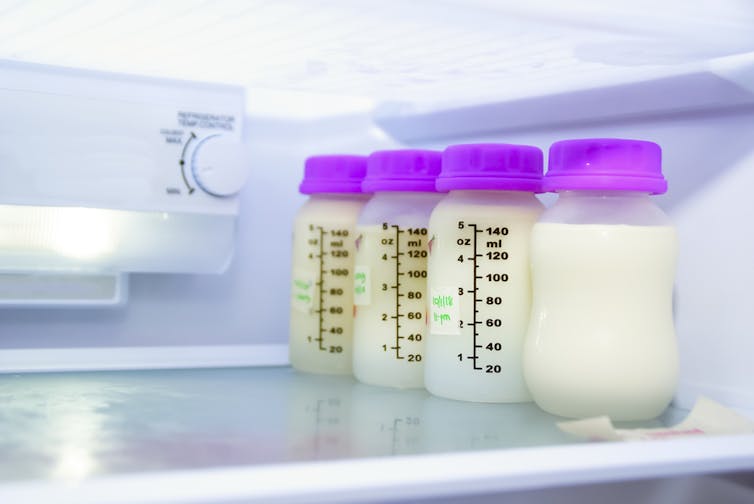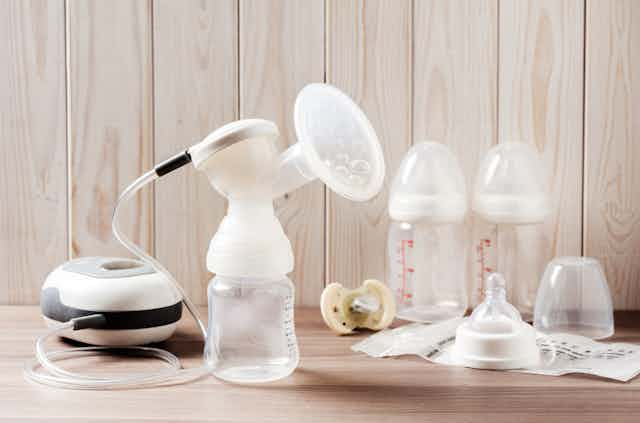Over the last few decades, the demand for breast milk has grown. The message “breast is best” has driven parents and caregivers to buy breast milk. Even the unwell, bodybuilders and “clean eaters” are known to use it. Once limited to milk banks and peer-to-peer sharing, a new for-profit milk market has emerged.
Companies producing a range of breast milk products are popping up around the globe, including in India, Cambodia, the US and England. These products include formula replacements – designed to be the sole source of nutrition – and other dietary supplements that complement or are added to formula.
Breast milk products are often marketed as safer, vegan, better for the immune system and infant development. Sometimes, in the case of replacements, products are marketed as more ethical than formula. And they are not just sold to individuals and caregivers, but also to healthcare providers and hospitals.
In England, one breast-milk processing company produces and sells, according to its own sources, six 50ml bottles for £45. Breast milk sale is now a profitable endeavour.
Notably, a company in England cites my past research with colleagues on its website to support mothers donating breast milk to it rather than selling or sharing peer-to-peer or to other online sites like onlythebreast.com. The research of mine that is being cited found selling milk informally poses risks to the consumer, whether an infant or an adult, because the milk can transmit viruses and bacteria, and can be contaminated. Using safety concerns as marketing, these companies promote themselves as a better alternative to the informal market because they test and process the milk to reduce the risk of food-borne illness.
But as companies seek to grow their business, they are likely to increasingly look to more stable longer-term contracts with larger entities, such as the NHS, and this poses other issues to us all. Companies courting healthcare providers to become their suppliers, may increase costs to the healthcare system while creating ethical dilemmas. If mothers move from donating to national health services and milk banks to donating to companies, the natural effect is to drive healthcare providers to turn to such contracts to provide milk in their services and communities.
Rationing access to milk banks – which limits who can get milk on fixed medical criteria, excluding, for example, those adults looking for fitness supplementation – directs milk to those who need it most. This has sought to keep demand in closer alignment with supply, but this is not the same in the for-profit sector. For-profit companies are beholden to their shareholders who wish to see growth and profit. The imperative to growth will probably see the privatisation of a previously public service.
Milk too will be needed to meet the growing demands and mass contracts. To avert concerns about exploitation, by their own accounts, many of these companies state that those women providing the milk do so as “donors”, meaning these women expressing milk are not paid a salary or per ounce payments, nor are they employed by the company. Many company websites convey a distinctively middle-class woman as the typical “donor”, but research suggests it is not always made clear that milk could instead be coming from those in poverty, often in developing countries or marginalised communities, who are paid to provide it.
While donation regimes were designed to avoid the commercialisation of women’s bodies, there are real concerns we are now engaging in the commodification of a woman-produced substance. But also, to meet healthcare-provider contracts, donations to companies are not stable enough. Companies can’t rely on the same public and community sentiments that drive NHS and other public system donations.
Pumping for profit
While marketing their products and donation programmes may increase milk donations to companies, employing women to pump on contracts is probably needed in the longer term to create a more stable supply. The result, though, could be women pumping for profit.
This has happened around the world, leading to issues like women pumping more than they would to meet company demands, or diverting nutrition from their own children. Indeed, such concerns about payment and employment practices led to community activism in the US and led Cambodia to a total ban on sales to the US.

Few governments, however, are revisiting their frameworks to address what some commentators have labelled “a corporate takeover”. Most responses to date have focused on the public health or food safety risks of milk-sharing and mother-to-consumer sales. Indeed, many countries regulate breast milk as a food and so have failed to explore the substantial issues about the new global marketplace.
Such a discussion must respect breastfeeding and long-held customary practices concerning infant feeding in diverse cultures, but we must address the fact that multinational corporations are moving into the space. Policymakers must consider what this means for women and their infants and place these voices at the centre of responses.
Blood, cells, tissues and organs are highly regulated in most countries to stop people from being exploited. We must urgently consider an international agreement on breast milk, which would help to guide governments in drafting regulation.
This will involve confronting difficult ethical questions. Is employing women to pump for profit really where we wish to head in the future? Are we comfortable paying women to produce milk, much like we do dairy cows? Should milk continue to flow from areas of poverty to areas of affluence?
Regulators must look at milk as more than a food. The global market means we must look instead to the women, and their children, who ultimately could be the greatest losers if for-profit companies put profit before people.

